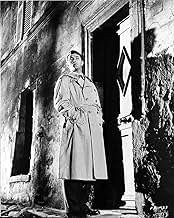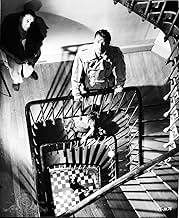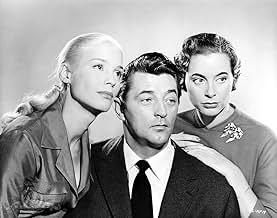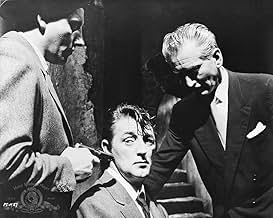Lorsqu'un millionnaire reclus et énigmatique meurt subitement sur la Côte d'Azur, son attaché de presse commence à enquêter sur le passé louche de son employeur.Lorsqu'un millionnaire reclus et énigmatique meurt subitement sur la Côte d'Azur, son attaché de presse commence à enquêter sur le passé louche de son employeur.Lorsqu'un millionnaire reclus et énigmatique meurt subitement sur la Côte d'Azur, son attaché de presse commence à enquêter sur le passé louche de son employeur.
- Réalisation
- Scénario
- Casting principal
- Brita
- (as Ingrid Tulean)
- Spring
- (as Frederick O'Brady)
- Blind Housekeeper
- (as Lilly Kann)
Avis à la une
An underrated transition film, a low budget affair that is pure European color and style. Visually, it almost presages the Euro-American "Charade" which was decidedly more up budget. Here, the director, an unknown Sheldon Reynolds, takes advantage of all the empty spaces and long pauses the pace required. The lighting is flat, almost anti-noir, with widescreen grandness and yet an oddly impersonal intimacy. Not to be contradictory--the scenes are generally quiet, with close conversations, but everything is filmed from a certain, and constant, distance.
It is this steady, quiet pace that makes the film work. And Robert Mitchum. He needs no explanation. The first of the two or three main women he connects with is a bit false, but the main one is a caricature of the Nordic beauty, and with sincere energy and charm. At times it really does look like she is smiling at Mitchum, not his character, as if she can't believe she's touring Stockholm, etc., with this famous man, and the movie gets away with it. Mitchum for his part keeps his cool, except for the necessary fist fight once or twice.
It's 1956, and international intrigues like this are slowly rising into a genre of their own. People come and go, scenes are not what they seem at first, people have false identities and foreign accents. The big theme (too big to believe, but that's okay, it's supposed to be) is that realignment of global power after WWII. The real thing, made up of shadowy individuals who seem to be above nationality, and only know about intrigue, money, and winning at any cost.
I don't want to pump this up too much. It's slow at times, and the acting not always right on. The effects (the atmosphere, the fights, etc) are sometimes so archly false you can't quite accept it even as theatrical, but just a cheap. But that's the exception. Fall into the pace of it and it's not bad at all.
Others have gone into the plot of this film, and I will not do that. What is interesting for me is that the plot of the story is interesting, and it has one of the most unusual ending of any film made in the 1950's. Also while some have criticized Mitchums performance and if he is walking through this film, I think he plays it just right, a man of cool. Ela Fitzgerald once commented that she liked the way Mitchum walked. During the open sequence we see him, I am sure she is referring to this film. Watching him, you realize that if the opportunity had come, and he had wanted to, he could have been the American equivalent to James Bond. Perhaps he could have played the character that Dean Martin would play of Matt Helm, and in films that would have been more in keeping with the books. He really carries this film. His performance reminds me a little of the character he played in OUT OF THE PAST, a wiser Jeff Bailey perhaps.
I see parallels with MR. ARKADIN and THE THIRD MAN, it really tries to be the latter, though does not succeed. It does have the classic look of the film noir, darkness with light shinning through certain areas of the frame, unusual for a color film of the time, and can be quite enjoyable to watch. Also the traces of the Noir film come immediately through when he informs his employers sexy young wife that she now has to become the grieving widow.
Eastman color, while cheaper than the original Technicolor, does have a tendency to fade over time. When I first saw this film in color, it was rather gorgeous to look at. Perhaps the comment about the horrible Eastman color is due to the fading of these prints.
If you liked Robert Mitchum in other films, I highly recommend this film just to see him. Without him the film would not be worth seeing at all.
A wealthy man of mystery drops dead in his villa on the Riviera. His American press agent (Robert Mitchum) finds him but suspicions grow when he's asked four times in succession if his employer `said anything' before he died. So Mitchum sets out to discover who the man was and how he accumulated his fortune. He starts with the merry widow (Genevieve Page) and travels on to Vienna and Stockholm, where he falls for the daughter (Ingrid Thulin) of a deceased industrialist whom may have been a blackmail target. Mitchum finds that he, too, is being followed....
Foreign Intrigue brings to mind Orson Welles' Mr. Arkadin of the previous year, memories of which emphatically ought not to be freshened. There's little true suspense, though the score, by Paul Durand and Charlie Norman, insists that yes, there is. Reynolds tosses in a little Alfred Hitchock here, a little Carol Reed there, but to little avail. About three-quarters of the way through, the picture reaches a lugubrious crescendo by revealing a vast global conspiracy harking back to the Third Reich. The only sensible reaction to all this is Mitchum's, who knew a good paycheck when he saw one and saunters through the movie with his eyes half-shut, as only he could do. Even so, he remains the only reason to sit through this foreign travelogue devoid of intrigue.
Le saviez-vous
- AnecdotesAround 53 minutes into the film on the veranda in a romantic scene with a beautiful Swedish woman, a rather large bee flies into the scene and flies right between them. They don't break and the bee flies away.
- GaffesAt about 7 minutes into the movie Mitchum is talking to Paige who is sunning herself at the pool. She tells him to throw her robe to her but when she puts it on, she is actually wearing a patchwork dress.
- Citations
Dave Bishop: Did you ever ask him who he really was?
Dominique: No.
Dave Bishop: Women are supposed to be curious... especially wives.
Dominique: Press agents are supposed to be curious.
Dave Bishop: I wasn't married to him.
Dominique: Except for the ceremony, neither was I.
- ConnexionsFollows Foreign Intrigue (1951)
- Bandes originalesFOREIGN INTRIGUE CONCERTO
Music by Charlie Norman
Meilleurs choix
- How long is Foreign Intrigue?Alimenté par Alexa
Détails
- Date de sortie
- Pays d’origine
- Site officiel
- Langues
- Aussi connu sous le nom de
- Foreign Intrigue
- Lieux de tournage
- Sociétés de production
- Voir plus de crédits d'entreprise sur IMDbPro
Box-office
- Budget
- 625 000 $US (estimé)
- Durée
- 1h 40min(100 min)
- Rapport de forme
- 1.85 : 1






























